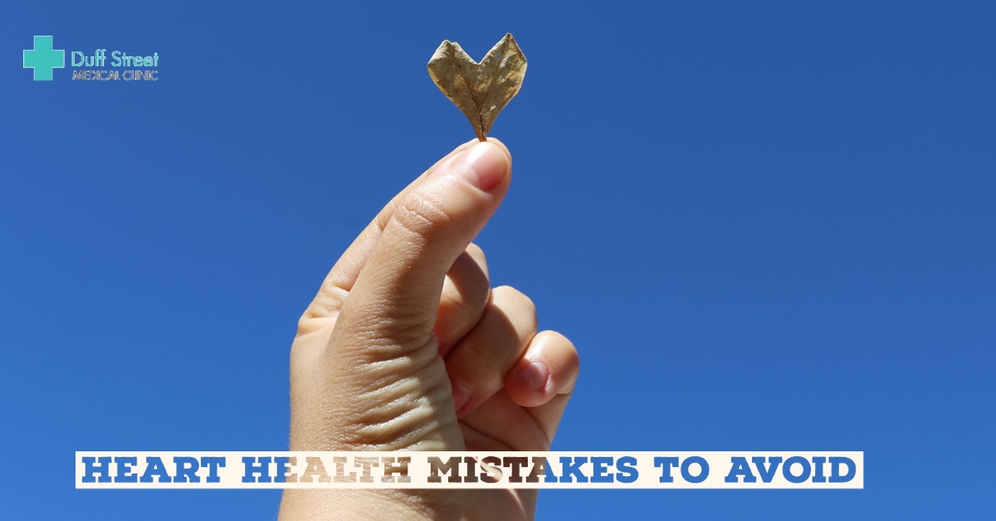Heart disease is the number 1 health threat we all face – claiming thousands of lives every year in Australia.
Despite the statistics, heart disease is highly preventable. An estimated 80% of cardiovascular disease including heart disease and strokes are preventable.
You may wonder, if they are highly preventable, why aren’t they? A lot of it comes down to being aware of the risk factors and avoiding making heart health mistakes.
Habits like skipping an annual health check or not visiting a doctor as often as required are some mistakes that can enhance your risks for heart disease.
Keeping that in mind, our doctor has come up with a list of 5 heart health mistakes people usually make and how you can fix them.
1) Ignoring medical needs
Unlike a heart attack, the symptoms of heart diseases are usually not noticeable. It is possible that you don’t notice any symptoms at all.
One of the best ways to protect your heart health is by visiting a doctor often and discussing your health needs with them. For example, if you skip visiting a doctor for an annual health check, you may also forgo your routine blood test, blood pressure or cholesterol checks too, all of which majorly impacts your heart health.
2) Skipping a heart screening test even when you’re healthy
You might think of yourself as completely healthy but still suffer from heart disease – you just don’t know it yet. In the early stages of heart disease, it is possible that you may not notice any symptoms.
So, understanding your risk factors can protect your heart, but it is possible only if you undergo a heart screening.
Basically, if you’e aged 45 or more (or 35 or above for Aboriginal Torres Strait Islander community) then it’s recommended to get your heart disease risk assessed by a doctor. If you need help, visit our heart health clinic in Toowoomba for a consultation.
If you smoke or have been diagnosed with diabetes or have high blood pressure or cholesterol or both, then is it highly recommended getting screened irrespective of your age to understand the risks associated.
3) Downplaying stress and emotions

Bottling up stress or emotions can heighten your risk for heart disease including heart attacks and strokes.
Whether you’re experiencing anger, grief or feeling frustrated, pushing those feelings aside can heighten your body’s internal response such as increased blood pressure and hypertension. Over time, these negative effects on our body can heighten the risk for many health issues including heart disease.
If you come across situations where you’re not able to control your emotions, seek help from others. Talking to a loved one can greatly help. Always inform your doctors if you need help and are unsure where or whom to turn to.
4) Don’t ignore chest pain or difficulty in breathing

Certain early signs of heart disease such as chest pain or facing difficulty in breathing are very similar to other health issues. For example, chest pain is common in both cardiovascular disease or inflammation of the muscles.
If you notice any generic symptoms like chest pain, breathing heavily or nausea, make no mistake and consult a doctor. Do not ignore genetic symptoms as waiting could have dire consequences.
So, this is how you should proceed: If you notice nausea, chest or abdominal pain, difficulty in breathing or any related symptoms that seem unusual for you, consult a doctor.
5) Avoid consuming added-sugar

We all love to eat sweets. But, there are many downsides to having a sweet tooth. Consuming too much added sugar food items can be one of the greatest threat to cardiovascular diseases.
Sugar is also present in things that you may not think of such as bread, ketchup and certain soup. In our diet, the top source of added sugar is from soft drinks, yoghurt, chocolates, cereals, cookies, cakes and most processed food.
A study between high-sugar diet and risk from heart disease shows that over a course of time, people who got their 17% to 21% daily calories from added sugar had a 38% more chances of dying from cardiovascular disease.
The mistake that people often makes is assuming certain food items are heart-healthy. Reading food labels is one of the best ways to keep a track on your sugar consumption. Look for added sugar content and avoid buying them or cut back on your intake.
Your Heart Health with Duff Street Medical Clinic
If you would like to consult our doctors for a heart health check, you can book an online appointment or call us at (03) 5995 4127 for further discussion.

